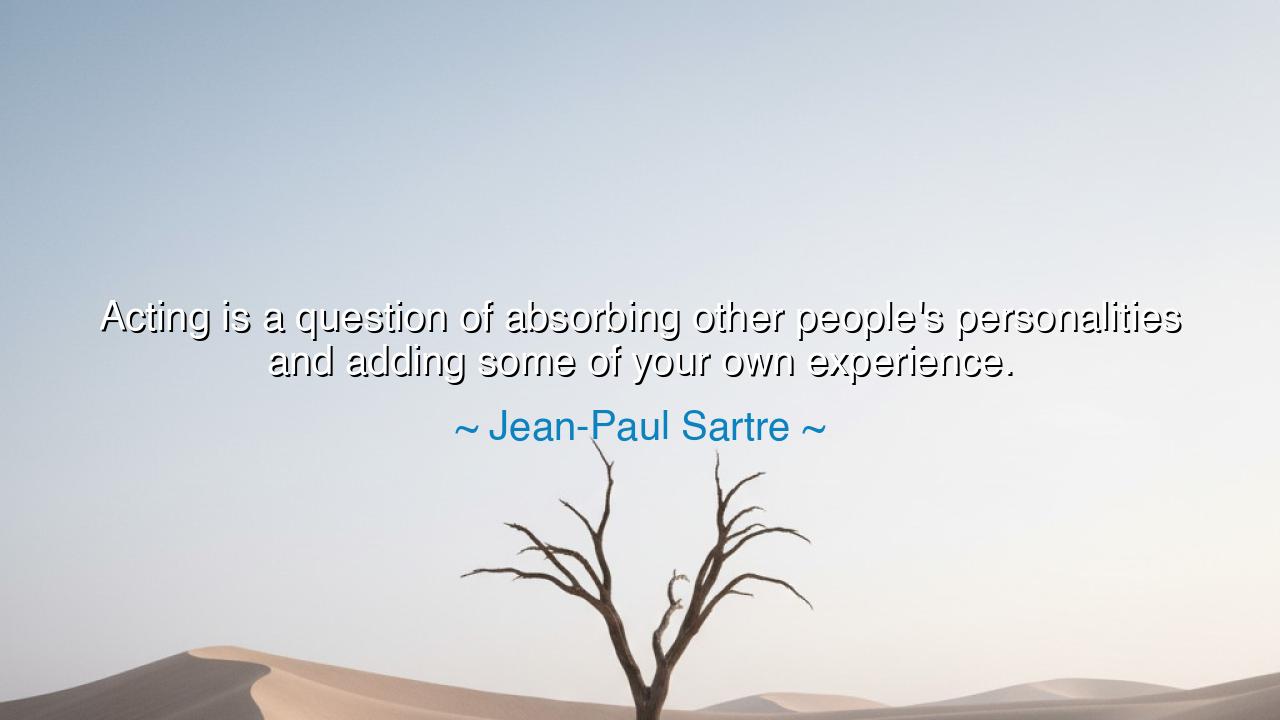
Acting is a question of absorbing other people's personalities
Acting is a question of absorbing other people's personalities and adding some of your own experience.






Host: The calm of the evening enveloped the room, the soft glow of the lamp creating a quiet, reflective atmosphere. Jack sat at the table, his fingers resting lightly on his cup, reflecting on Jean-Paul Sartre’s words. Jeeny stood near the window, her arms loosely crossed, absorbed in thought as she considered the deeper meaning behind the statement.
Jeeny: “I’ve been thinking about what Jean-Paul Sartre said: ‘Acting is a question of absorbing other people's personalities and adding some of your own experience.’ It’s such a fascinating perspective on what it means to truly take on a role, isn’t it? The idea that acting is about more than just mimicking or replicating—it’s about blending someone else’s identity with your own, creating something new in the process.”
Jack: “Yes, exactly. Sartre is showing us that acting isn’t just about pretending to be someone else. It’s about integration—absorbing someone else’s personality and combining it with your own life experiences to bring the character to life. It’s a unique form of self-expression because you’re using your personal insights, your emotion, and your perspective to shape and portray someone else.”
Jeeny: “Right. It’s not just about the technical skill of embodying a character or memorizing lines—it’s about truly becoming that person. But in doing so, you’re also infusing your own understanding, your own truth, into that character. It’s almost like every performance is a blend of two identities—yours and the character’s. You can’t separate the two, because your experiences as an actor shape how you embody someone else.”
Host: The stillness in the room deepened, as they reflected on the complexity of acting—not just as a skill, but as an art form that requires both vulnerability and creativity. Jack’s fingers rested on the table, while Jeeny’s expression softened, considering how much of ourselves we bring to the roles we play, consciously or not.
Jack: “It makes me think about how acting is also a form of personal exploration. By stepping into someone else’s shoes, you not only have to understand their personality and motivations, but you also have to see the world through their eyes. It’s like Sartre is saying that you can’t really be true to a character unless you bring yourself into it, unless you use your own experiences to shape that person’s reality. In that way, acting is a dialogue between the self and the character.”
Jeeny: “Exactly. Acting isn’t just a performance—it’s a form of communication, a way of connecting with others through the lens of the character. But it’s also a personal process where you get to reflect on your own life experiences and channel them into someone else’s story. It’s about understanding and transforming yourself in the process of transformation into someone else. It’s a kind of shared experience.”
Jack: “And I think that’s why acting is so powerful. It’s not just about emulating someone else; it’s about becoming them, understanding them in a way that’s deep and personal. That’s what makes great performances so moving—because they resonate with the actor’s own truth and vulnerability. It’s a blending of two worlds: the character’s and the actor’s.”
Jeeny: “Yes, and I think that’s why acting can be so transformative, not just for the audience, but for the actor themselves. By absorbing another personality, you’re also forced to explore and question your own. It’s a constant process of growth and discovery—Sartre is showing us that acting is as much about understanding yourself as it is about understanding someone else. It’s about opening yourself up to new experiences, new emotions, and new perspectives.”
Host: The quiet in the room grew deeper, the realization that acting is not just an external craft, but an internal journey of self-discovery and expression. Jean-Paul Sartre’s words had reminded them that the best performances come from a place of deep authenticity, where the actor allows themselves to become part of the character. Jack leaned back slightly in his chair, while Jeeny’s gaze turned from the window back to him, both understanding that the art of acting involves not just embodying a character, but also transforming through it.
Jack: “So, Sartre is showing us that acting is really an act of integration. It’s about blending your own experiences with the personality of the character, creating something completely new in the process. It’s not just about playing a role—it’s about becoming that role and bringing your truth into it.”
Jeeny: “Exactly. Acting is a deep, personal process that requires vulnerability and creativity. By bringing ourselves into the characters we portray, we allow our own experiences and emotions to enrich the performance, making it more real, more powerful, and more relatable.”
Host: The evening had fully settled in, the quiet understanding between them a reminder that acting is not just about mimicry or performance—it’s about the deep connection between the actor and the character, a process that requires both self-awareness and personal growth. Jean-Paul Sartre had shown them that the heart of acting lies in the ability to absorb, transform, and express both the character’s and the actor’s essence. The world outside had darkened, but inside, there was light—a recognition that acting, at its core, is about understanding and expressing the complexity of both self and other.






AAdministratorAdministrator
Welcome, honored guests. Please leave a comment, we will respond soon